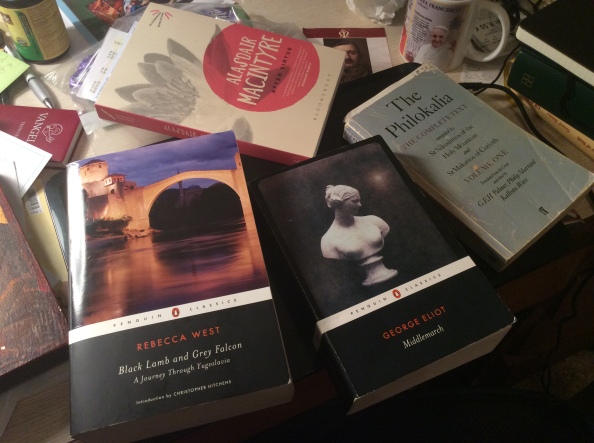 As I begin to explore different literary blogs, I have found that many of them have recently put together a “personal canon” of sorts. (Some examples: here, here, and here.) For many years, I looked to this list as something of a “canon” for myself, but I’ve found myself going back to a shorter list of books over and over. Below is a rough list of the books that come to mind as some of the most important to me. I attempted to divide them by genre at first, but I couldn’t make a clean divide between theology and philosophy, or even between theology and biography, and Rebecca West’s masterpiece does not sit easily in any genre. So I simply divided into “older” and “newer”, with a few added to the end.
As I begin to explore different literary blogs, I have found that many of them have recently put together a “personal canon” of sorts. (Some examples: here, here, and here.) For many years, I looked to this list as something of a “canon” for myself, but I’ve found myself going back to a shorter list of books over and over. Below is a rough list of the books that come to mind as some of the most important to me. I attempted to divide them by genre at first, but I couldn’t make a clean divide between theology and philosophy, or even between theology and biography, and Rebecca West’s masterpiece does not sit easily in any genre. So I simply divided into “older” and “newer”, with a few added to the end.
Older books:
- The Holy Bible.
- The works of Plato and Aristotle.
- The Iliad and the Odyssey by Homer.
- On Christian Doctrine and the Confessions by Augustine.
- The Philokalia (vol. 1) by Evagrius, John Cassian, et alia.
- The Consolation of Philosophy by Boethius.
- The Little Flowers of Saint Francis.
- The works of Thomas Aquinas.
- The Cloud of Unknowing.
- The Autobiography of St Teresa of Avila.
- Don Quixote by Cervantes.
- The Introduction to the Devout Life by St Francis de Sales.
Newer books:
- Black Lamb and Grey Falcon by Rebecca West.
- Middlemarch by George Eliot.
- The Brothers Karamazov by Fyodor Dostoevsky.
- The stories and novels of Flannery O’Connor.
- The Adventures of Huckleberry Finn by Mark Twain.
- The Glass Bead Game by Hermann Hesse.
- The Story of a Soul by St Therese of Lisieux.
- After Virtue by Alasdair MacIntyre.
- Development of Christian Doctrine by John Henry Newman.
- The Russian Church and the Papacy by Vladimir Soloviev.
- Miscellaneous writings of St Maximilian Kolbe.
- Saint Thomas Aquinas by G.K. Chesterton.
Books that got me started:
- Slaughterhouse-Five by Kurt Vonnegut.
- Animal Farm by George Orwell.
- My Name is Red by Orhan Pamuk.
- On Writing by Stephen King.
I could have added many more books to the list (Jane Austen, Sigrid Undset, Manzoni, more George Eliot), but then it would end up being a list of all the books I have enjoyed at some point or another! Some of the titles also require some more explanation (like Soloviev), but all in good time. I’m sure this list is not yet finished.
I am so glad to also see Middlemarch on your list! I just adore that book as well as Adam Bede.
LikeLike
If that is so, I will have to read Adam Bede soon! So far The Lifted Veil is the only George Eliot that I have found disappointing, and even that book was fine for what it was.
LikeLiked by 1 person
I love that you call Middlemarch a newer book. 🙂
LikeLiked by 1 person
Hi, Maximilian. I thought you might like this site if you’ve never seen it. 🙂
LikeLike
Awww, what a great list.
LikeLike
I like how you categorized your canon into three separate groups; fitting them all into one was a challenge for me as they represent different times, and meaning, in my life. We have the Bible and Brothers Karamazov in common, but I would like to read more Christian literature as you have done.
LikeLike
Great list! God bless!
LikeLike
I’ve been seeing this tag everywhere. I really need to do it now. Introduction to the Devout Life is one of three devotionals I come back to over and over again. The other two being (Revelation of Divine Love by Julian of Norwich and my current favorite Into Your Hands by Wilfrid Stinissen). Don Quixote was wonderful! I read it last winter. It was the perfect time of year to read it. In general, I love meta-fiction. Alas, I am not a Thomist. I took a medieval philosophy class, so I read some of his questions, but I just don’t think like a scholastic. But I’m thoroughly impressed by Thomists. Augustine’s Confessions is one of the few books I initially disliked and later become one of my favorite books. I simply was not in the right state of mind when I read it at 17. Who has ever really experienced guilt at 17?
LikeLike